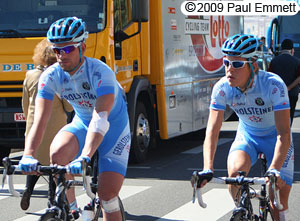 A report by Austria’s Bundeskriminalamt into Bernhard Kohl’s manager, Stefan Matschiner, has revealed the names of more cyclists, according to newspapers Oberösterreichische Nachrichten and De Telegraaf.
A report by Austria’s Bundeskriminalamt into Bernhard Kohl’s manager, Stefan Matschiner, has revealed the names of more cyclists, according to newspapers Oberösterreichische Nachrichten and De Telegraaf.
The report writes that countless blood transfusions took place in a one-room apartment in the Austrian city of Linz, rented by Kohl, Olympic cross-country skiing champion Christian Hoffman and former king of the mountains, Michael Rasmussen.
Stefan Matschiner moved his doping headquarters from Wien, Austria to Laakirchen, Steyrermühl en Linz after several Austrian athletes tested positive during the Torino Olympic Games in 2006. When police investigated him in January 2008, he chose to move his activities to Budapest.
Kohl’s confession along with the evidence gathered from the Human-Plasma blood bank affair lead Austria’s doping task force to uncover a suspected doping ring with the possible involvement of several high profile Dutch athletes. The report quotes a neighbour who regularly witnessed expensive Dutch-licensed cars briefly parked outside the address.
The report explains that Kohl, Rasmussen, and Hoffman were central in the coordination and distribution of doping products. The trio had invested a total of 93,906.40 euro into a blood centrifuge and related equipment since April 2006, using the equipment to treat blood with dynepo, Cera, and other doping products. The report also states that Matschiner rented the blood centrifuge to third party athletes. On April 3rd 2009, Austrian police seized the equipment from Matschiners headquarters in Budapest. Tests showed that the blood centrifuge had preformed 85 treatments in the past two years.
In Kohl’s confession, he stated that Matschiner told him that cyclists Michael Boogerd, Thomas Dekker, and the suspended Italian Pietro Caucchioli made a one time payment to use the blood centrifuge. Both Dutch cyclists denied the claims and have not yet been called on by the Austrian police, despite publicly stating they are willing to cooperate.
Kohl underwent his last treatment on September 24th 2008, several weeks after the Tour de France where he tested positive for cera after placing third overall. Matschiner declared that Rasmussen and Caucchioli also visited on the same day to deposit blood. Rasmussen, back in competition since July 25th 2009, denies this claim after being questioned by the Austrian police on August 7th.
The 12-paged report details Kohl’s long history of doping, starting in 2000 and ending in 2003. While still riding for Rabobank’s continental team Kohl bought 30,000 single treatments of epo from the Austrian cyclist, Christian Pfannberger, suspended after testing postitive for Cera. In 2005, Kohl underwent three treatments at Human-Plasma. He continued to order doping products such as epo and growth hormones until 2008 via Matschiner, with an estimated worth between 50,000 and 70,000 euro. Kohl distributed the products throughout the peloton, including retired Gerolsteiner teammate, Marcu Zberg. In the spring of 2008, Kohl stated he sold Zberg 24,000 single treatments of dynepo.